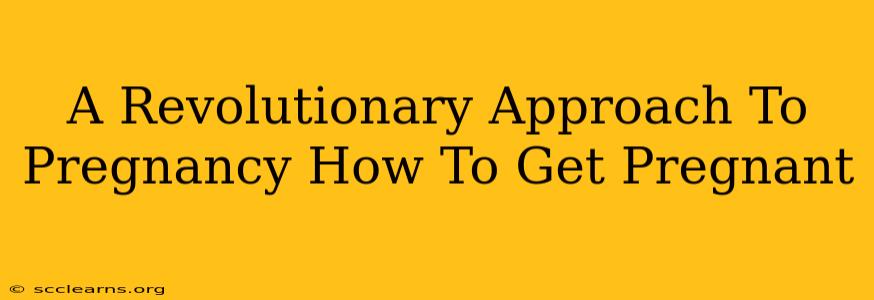Having trouble conceiving? Many couples face challenges on their journey to parenthood, and it can be incredibly frustrating and emotionally draining. This post explores a revolutionary approach to pregnancy, combining traditional wisdom with cutting-edge research to help you increase your chances of conceiving naturally and quickly. We'll cover everything from optimizing your lifestyle to understanding your fertility cycle.
Understanding Your Fertility Window: The Key to Conception
The most crucial aspect of getting pregnant is understanding your fertility window. This is the period during your menstrual cycle when you're most likely to conceive. It's typically around 6 days long, including the day of ovulation and the 5 days leading up to it.
Tracking Your Cycle: Beyond the Calendar
While calendar-based methods can offer a general estimate, they are often unreliable. For a more accurate prediction, consider these methods:
- Basal Body Temperature (BBT): Measuring your temperature first thing in the morning can reveal a slight increase after ovulation. This temperature shift indicates you've ovulated.
- Ovulation Predictor Kits (OPKs): These at-home tests detect the surge in luteinizing hormone (LH) that precedes ovulation, giving you a more precise timeframe.
- Cervical Mucus Monitoring: Pay attention to the changes in your cervical mucus. Fertile mucus is clear, stretchy, and resembles egg white.
- Fertility Tracking Apps: Several apps combine various methods to help you track your cycle and predict your fertile window more accurately. Research different apps to find one that suits your needs.
Optimizing Your Lifestyle for Enhanced Fertility
Beyond tracking your cycle, several lifestyle factors significantly impact your chances of getting pregnant.
Nutrition: Fueling Your Fertility
A healthy diet rich in essential nutrients plays a crucial role. Focus on:
- Folic Acid: Crucial for fetal development. Start taking a prenatal vitamin containing folic acid before you start trying to conceive.
- Iron: Iron deficiency can affect fertility. Include iron-rich foods in your diet or consult your doctor about supplementation.
- Antioxidants: Protect your eggs and sperm from damage. Include plenty of fruits and vegetables in your diet.
Exercise: Finding the Right Balance
Regular moderate exercise is beneficial, but excessive exercise can disrupt your hormonal balance and hinder fertility. Aim for at least 30 minutes of moderate-intensity exercise most days of the week.
Stress Management: The Silent Fertility Killer
Chronic stress significantly impacts fertility. Implement stress-reducing techniques like:
- Yoga: Promotes relaxation and reduces stress hormones.
- Meditation: Helps calm the mind and improve overall well-being.
- Deep Breathing Exercises: A simple yet effective way to manage stress.
Seeking Professional Help: When to Consult a Doctor
If you've been trying to conceive for a year (or six months if you're over 35) without success, it's crucial to consult a fertility specialist. They can perform various tests to identify any underlying issues and recommend appropriate treatments.
A Holistic Approach: Combining Traditional Wisdom with Modern Science
This revolutionary approach isn't just about using ovulation prediction kits; it's about embracing a holistic lifestyle that supports your body's natural ability to conceive. By carefully tracking your cycle, nourishing your body with a healthy diet, managing stress effectively, and seeking professional guidance when needed, you significantly increase your chances of a successful pregnancy journey. Remember, patience and perseverance are key. This journey is unique to each couple, and seeking support from your partner, family, and friends is essential.

